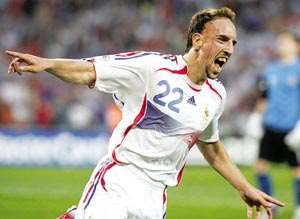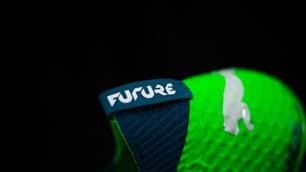10 to watch in 2007
Page 1 of 13 | Single page
He’s the scar-faced winger with a turbulent past. And after setting the World Cup alight, he’s ready to bring his dazzling skills to England.
AGE 23
CLUB Marseille
POSITION Winger
LOWDOWN Fiery Frenchman who’s yet to settle at club level. Another move awaits.
Twelve months ago, not many football fans in Britain had heard of Franck Ribery. Hardly surprising, given that he was still playing in France’s Third Division in 2004. Back then nobody could have predicted he’d be one of France’s leading lights in an improbable run to the World Cup Final two years later. But now, aged 23, the boy who grew up on a rough council estate in the north of France dreaming of being the next Chris Waddle, has the world at his feet following a roller-coaster ride that has seen him first jump two divisions to France’s top flight, then scarper to Galatasaray for a six-month fling before returning to Marseille, setting Le Championnat alight with his trickery and joie de vivre, and forcing his way into the World Cup side alongside another of his boyhood heroes, Zinedine Zidane. As Ribery says: “It’s mad!”
And yet here we are predicting even greater things to come for the winger they call ‘Scarface’. Because the Ribery story, all Boy’s Own stuff with its unlikely twists and turns and rags-to-riches story arc, is set to continue on it’s upward climb. A host of big clubs are primed to pounce and Marseille are resigned to selling him to an overseas side to prevent him going to French champions Lyon.
Meanwhile Ribery, after a breakthrough 2005-06 season in France, where he won the Player of the Month award three times, was named Young Player of the Year and scored the Goal of the Season (a thumping 30-yard volley against Nantes), has shown that the better the level of competition, the better he plays. He got his first taste of the cream of world football in Germany last summer after his meteoric rise thrust him into Raymond Domenech’s France team and now Ribery wants more. Next season, he intends to be playing in the Champions League, and England should be the place he gets his chance.
“Franck is now a very big player in Europe and it’s true the biggest clubs want him,” says his representative, Bruno Heiderscheid. And, for once, we’re inclined to agree with an agent. But we’re getting ahead of ourselves. Let’s go back to the start, to the grim northern port town of Boulogne-sur-Mer, where Franck Ribery was brought up and his problems began.
At the age of two, a horrific car crash saw little Franck go through a windscreen and pick up the scars down the side of his face that have marked him ever since.
“I was very young and I don’t remember what happened, but it was pretty serious,” explains Ribery, who has come to wear his disfiguration with a defiant form of pride after years of denigration.
“In fact, it’s not really the accident that has caused me the most problems as I was so young. It was more the way people looked at me. There were some who would take the mickey, and my family had to battle against that. I grew up with that. Now I’m earning a good living people often ask why I don’t have plastic surgery or something but I don’t feel the need. The scars are part of me, and people will just have to take me as I am.”
Like most of France’s working-class northerners, Ribery was brought up to speak the local patois, called ch’ti, a mixture of French and Flemish. And when he wasn’t at school or skiving, he’d spend his time at the foot of his dilapidated block of flats, kicking a ball around until dusk in the
notorious Chemin-Vert estate on the edge of Boulogne. It was there that he met his future wife, Wahiba, who persuaded him to convert to Islam. And it was playing for Boulogne’s youth team that he was spotted at the age of 13 and invited to attend the academy down the road at Lille.
It should have been the beginning of something good for Ribery, the ticket out of his dead-end town. Instead he ended up back in Boulogne three years later, kicked out of Lille for not trying in his school classes and getting into too many rucks.
“I got thrown out because I wasn’t very good at school, mainly,” says Ribery. He still remembers how he felt on hearing Lille’s decision: “It was frightening. I said to myself, ‘Maybe that’s it, maybe I’ll never be a footballer.’ The toughest thing of all was having to tell my dad that I wasn’t at Lille any more. My dad’s the one who counts the most for me as far as football is concerned, he’s always been there by my side. Luckily for me, I went back home and managed to play again straight away with the under-17s at Boulogne.”
Jean-Luc Vandamme, the man who whisked him off to Lille, refutes suggestions that Ribery is none too clever and prefers to explain the reasons he always believed the skinny youngster he first noticed 10 years ago could go on to make it to the top. “Franck has great anticipation,” Vandamme says. “He analyses three times faster than others. On the pitch, he has all the problems worked out while others are still pondering. People think he’s thick but that’s pure stupidity – he is anything but. He has a practical intelligence, like all the great players.”
As another early coach, Jose Pereira, says: “Even a street lamp would have been able to see that Franck was a very good player, but you always had to keep your eyes on him, like a pan of milk on the boil. He was a kid who grew up in the street.”
AGE 23
CLUB Marseille
POSITION Winger
LOWDOWN Fiery Frenchman who’s yet to settle at club level. Another move awaits.
Twelve months ago, not many football fans in Britain had heard of Franck Ribery. Hardly surprising, given that he was still playing in France’s Third Division in 2004. Back then nobody could have predicted he’d be one of France’s leading lights in an improbable run to the World Cup Final two years later. But now, aged 23, the boy who grew up on a rough council estate in the north of France dreaming of being the next Chris Waddle, has the world at his feet following a roller-coaster ride that has seen him first jump two divisions to France’s top flight, then scarper to Galatasaray for a six-month fling before returning to Marseille, setting Le Championnat alight with his trickery and joie de vivre, and forcing his way into the World Cup side alongside another of his boyhood heroes, Zinedine Zidane. As Ribery says: “It’s mad!”
And yet here we are predicting even greater things to come for the winger they call ‘Scarface’. Because the Ribery story, all Boy’s Own stuff with its unlikely twists and turns and rags-to-riches story arc, is set to continue on it’s upward climb. A host of big clubs are primed to pounce and Marseille are resigned to selling him to an overseas side to prevent him going to French champions Lyon.
Meanwhile Ribery, after a breakthrough 2005-06 season in France, where he won the Player of the Month award three times, was named Young Player of the Year and scored the Goal of the Season (a thumping 30-yard volley against Nantes), has shown that the better the level of competition, the better he plays. He got his first taste of the cream of world football in Germany last summer after his meteoric rise thrust him into Raymond Domenech’s France team and now Ribery wants more. Next season, he intends to be playing in the Champions League, and England should be the place he gets his chance.
“Franck is now a very big player in Europe and it’s true the biggest clubs want him,” says his representative, Bruno Heiderscheid. And, for once, we’re inclined to agree with an agent. But we’re getting ahead of ourselves. Let’s go back to the start, to the grim northern port town of Boulogne-sur-Mer, where Franck Ribery was brought up and his problems began.
At the age of two, a horrific car crash saw little Franck go through a windscreen and pick up the scars down the side of his face that have marked him ever since.
“I was very young and I don’t remember what happened, but it was pretty serious,” explains Ribery, who has come to wear his disfiguration with a defiant form of pride after years of denigration.
“In fact, it’s not really the accident that has caused me the most problems as I was so young. It was more the way people looked at me. There were some who would take the mickey, and my family had to battle against that. I grew up with that. Now I’m earning a good living people often ask why I don’t have plastic surgery or something but I don’t feel the need. The scars are part of me, and people will just have to take me as I am.”
Like most of France’s working-class northerners, Ribery was brought up to speak the local patois, called ch’ti, a mixture of French and Flemish. And when he wasn’t at school or skiving, he’d spend his time at the foot of his dilapidated block of flats, kicking a ball around until dusk in the
notorious Chemin-Vert estate on the edge of Boulogne. It was there that he met his future wife, Wahiba, who persuaded him to convert to Islam. And it was playing for Boulogne’s youth team that he was spotted at the age of 13 and invited to attend the academy down the road at Lille.
It should have been the beginning of something good for Ribery, the ticket out of his dead-end town. Instead he ended up back in Boulogne three years later, kicked out of Lille for not trying in his school classes and getting into too many rucks.
“I got thrown out because I wasn’t very good at school, mainly,” says Ribery. He still remembers how he felt on hearing Lille’s decision: “It was frightening. I said to myself, ‘Maybe that’s it, maybe I’ll never be a footballer.’ The toughest thing of all was having to tell my dad that I wasn’t at Lille any more. My dad’s the one who counts the most for me as far as football is concerned, he’s always been there by my side. Luckily for me, I went back home and managed to play again straight away with the under-17s at Boulogne.”
Jean-Luc Vandamme, the man who whisked him off to Lille, refutes suggestions that Ribery is none too clever and prefers to explain the reasons he always believed the skinny youngster he first noticed 10 years ago could go on to make it to the top. “Franck has great anticipation,” Vandamme says. “He analyses three times faster than others. On the pitch, he has all the problems worked out while others are still pondering. People think he’s thick but that’s pure stupidity – he is anything but. He has a practical intelligence, like all the great players.”
As another early coach, Jose Pereira, says: “Even a street lamp would have been able to see that Franck was a very good player, but you always had to keep your eyes on him, like a pan of milk on the boil. He was a kid who grew up in the street.”
 |
| Ribery introduces himself to the world after scoring against Spain last year. |
Related Articles

PUMA reveals new 'Stun Pack'

PUMA Future 18.1 up close













